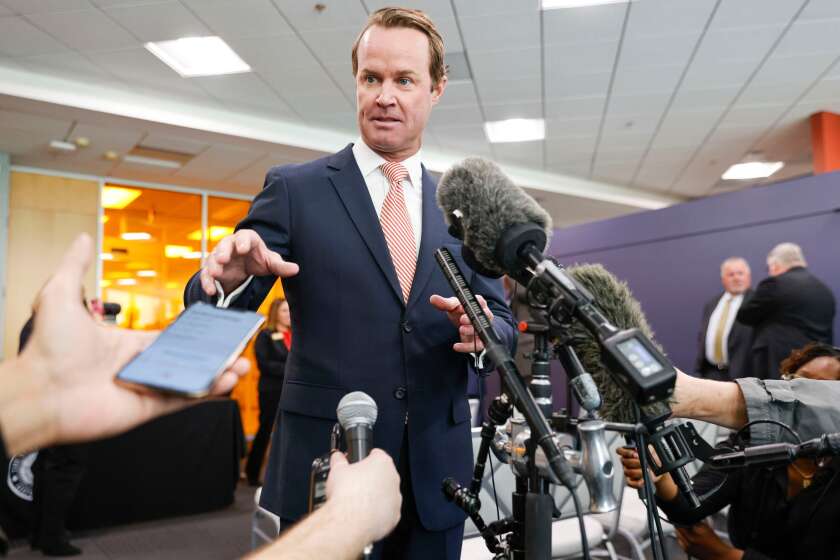The Political Future of Fani Willis: A New York jury found former President Donald Trump guilty on all counts regarding a "hush money" and business records case on Thursday. The verdict was historic, but is also represented something that hasn't happened in any of the other cases involving Trump: Holding and completing a trial.
The other charges against Trump include the election interference indictment brought against him and a long list of alleged co-conspirators in Fulton County, Ga., last year. A couple of the accused pleaded guilty right away, but the case is on hold as a state appellate court prepares to hear complaints about professional misconduct involving Fani Willis, the county’s district attorney, who had a romantic relationship with a special counsel in the case.
That will likely hold up the trial until after the election. Although the judge allowed it to proceed, he found that there was a “significant appearance of impropriety.” Conservative media lambasted Willis for the relationship and the couple’s out-of-state travels. She received numerous threats; in April, a California man was indicted by a federal grand jury for sending her death threats. Willis has also been criticized for her handling of sprawling Racketeer Influenced and Corrupt Organization (RICO) cases, including one involving rapper Young Thug that is the longest trial in state history.
None of this seems to have fazed Fulton County voters. Willis took 87 percent of the vote in last week’s Democratic primary. “In terms of how people feel about her, the cross-section of the votes she received — well into the 80th percentile — really tells the story,” says former Atlanta Mayor Shirley Franklin.
Her Republican opponent is Courtney Kramer, who served as an intern in the Trump White House and can be counted on to keep up the drumbeat of complaints about Willis. But Kramer has worked only a few years as an attorney and has no criminal trial experience. Outside the high-profile cases, Willis will be able to run on a historic drop in homicides and other violent crime in Atlanta last year, after the city had experienced, along with many major cities, a pandemic-era spike.
“Fani Willis has always been a strong campaigner, and the way that prominent Georgia Democrats rallied around her in her primary re-election strongly suggests that she won’t have much trouble in her November re-election,” says Howard Franklin, a lobbyist and consultant in Atlanta (and no relation to the former mayor). “I also expect she’ll have a larger group of donors and the political war chest to tell voters about her less-heralded but equally important efforts to keep Fulton County safe.”
Fulton County was central to the victories of President Joe Biden and the state’s two Democratic U.S. senators. It’s unusual, in fact, for a Republican even to bother running for district attorney in the county. None had for more than a half-century. “It would be unusual for her, a credible candidate with her record and her experience, not to win,” says Shirley Franklin.
As the Trump indictments rained down last year, there was a lot of media speculation about how local voting habits would affect jury pools. It turned out, at least in Fulton County, that the local partisan bent also mattered for the prosecutor.

Shafkat Anowar/TNS
Phelan had a big target on his back for a couple of reasons. The state House impeached state Attorney General Ken Paxton, but after the state Senate failed to convict him, Paxton led a vendetta against Phelan and dozens of other House Republicans who had not supported him. The House also failed to pass a school voucher bill backed by Gov. Greg Abbott. Although Abbott stayed neutral in the Phelan race, he devoted millions to taking out other GOP incumbents.
Phelan lost more than a dozen allies during the primaries, including six who had made it to Tuesday’s runoffs. He now faces a serious challenge for his leadership post, with one committee chair already running against him. Lt. Gov. Dan Patrick, a Phelan antagonist, predicted he would not serve again as speaker. “To those considering supporting Dade Phelan as speaker in 2025, ask your 15 colleagues who lost re-election how they feel about their decision now,” Paxton said in a statement. “You will not return if you vote for Dade Phelan again.”
Covey complained that Phelan only won the runoff by convincing Democrats to turn out for him. (Phelan “has blatantly stolen an election,” Paxton said.) Now more conservative Republicans are saying he’ll only hold onto his job as speaker if he’s able to convince House Democrats to support him, thus proving their charge that he is a RINO, or Republican in name only.

(David Kidd/Governing)
Alaska is not unusual. Most voters in Oklahoma will have no real choice in state House contests, either. Fifty of the 101 members were re-elected by virtue of filing and having no one run against them. Many of the rest of the seats will be decided in primaries next month, meaning voters in two-thirds of state House elections will have no choice come November. The story is similar in the 26 state Senate races. “Nationwide, over one-third of state legislative incumbents face neither a primary nor general election challenger,” says Steven Rogers, a political scientist at St. Louis University who has written about lack of legislative competition. “These incumbents win re-election by just signing up for the job.”
For a long time now, most legislative seats have not been competitive, strongly favoring one party or the other. At this point, though, entire legislatures are not competitive, with chamber turnover in the low single digits in recent cycles. That creates strong disincentives for potential candidates to bother running, or for parties to devote resources to what seem like losing causes.
In 2022, partisan control of 22 chambers was decided before any votes were cast, due to lack of competition, with the GOP guaranteed veto-proof majorities in 13 chambers because so few Democrats bothered to run. “It’s critical for Democrats to run everywhere, even in non-competitive districts,” says Gaby Goldstein, co-founder of Sister District Project, which supports Democratic legislative candidates. “Democrats have to take a much longer view and commit to candidates, districts, regions and states that might not be competitive but will be later, if we start investing now.”
That’s happening this year in Missouri, Rogers notes. Two years ago, only 69 out of 163 districts had both Democratic and Republican candidates, guaranteeing the preservation of GOP supermajorities. This year, Democrats have successfully recruited candidates to oppose Republicans in 114 districts, giving them at least a numeric chance to break supermajorities.
It should be obvious, after all, that parties can’t win if they don’t have anyone on the ballot. “Competition is important to give voters choices, and for a healthy democracy,” Rogers says. “If an incumbent runs uncontested, they may be more willing to vote in favor of special interests, instead of their constituents.”
Previous Editions
-
In multiple states, voters will decide whether to reject justices who upheld abortion bans and restrictions. Separately, many prominent Republicans continue to oppose Trump, but that probably won't sway many voters.
-
Sen. Mike Braun is favored to win next week's primary and then coast to the governorship in the fall. Meanwhile, does it matter that Donald Trump is late in setting up his campaign's ground game?
-
Democrats hope an abortion measure gives Biden a chance, but the Sunshine State remains pretty red. The outcome of the presidential race, meanwhile, may turn on a vote in Nebraska.
-
Canceling the presidential primary cost Florida Democrats in local races. In Ohio, it looks like Jason Stephens will survive as state House speaker after contested primaries.













